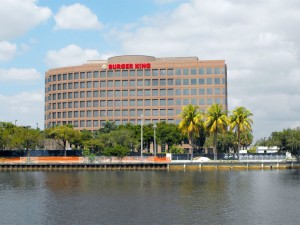The original text link:
https://blogs.ubc.ca/yitingzhang/2014/09/27/merger-tax-inversion-save-costs/
When I read Yiting Zhang’s blog posted in late September talking about Burger King’s plan of merging Tim Horton and switching its headquarters to avoid high tax rate set in the US, I realized that things are going to a relatively different direction. On October 20th, 2014, after the revision of regulation on Tax inversion trade, the American drug company AbbVie’s merging plan with the British pharmaceutical producer called Shire stopped abruptly. It cost AbbVie nearly 1.6 billion dollars as the default money. We might want to ask: Why?
In the past decades, the US government has been frustrated by tax inversion problem due to its powerful damage to economy and the whole business environment. By restricting such relocation, recently, the US government has increased the ownership change in tax inversion from 25% to 50%; moreover, despite of the merger, firms must keep their managing branch in USA. Let us look at the example we talk about. AbbVie does prepare a large amount of capital oversea, planning that once after the merger, it can draw upon the amount. However, according to the US new regulation, once AbbVie uses its oversea capital, it would be charged for considerable taxes, making the merger operation hard to continue. What we could read from the news the the latest tendency of tax inversion—it is no longer a profitable or practical way to avoid high tax burden in local. In addition, even though certain companies did succeed to relocate, the difficulties they faced exceed far beyond what they gained, Yiting criticized that Burger King might be more profitable in use of tax inversion, considering the factors I give above, I might have to say I disagree with this perspective.
We have to admit that government does play an important role in business world for it can alter laws and regulations. After all, Burger King’s merger plan might struggle.
Works Cited:
1.”Tax inversion”, Wikipedia
http://en.wikipedia.org/wiki/Tax_inversion
2. Yang Liu. “Burger King makes use of tax inversion, leading to disputes in the USA”. Finance Huanqiu. Aug 26, 2014
http://finance.huanqiu.com/view/2014-08/5118503.html
3. Richard Rubin. “Burger King Deal Advances Amid U.S. Inversion Crackdown”. Bloomberg. Sept 23, 2014
http://www.bloomberg.com/news/2014-09-23/lew-tries-to-limit-tax-cut-deals-with-inversion-crackdown.html
4. David Gelles. “After Tax Inversion Rules Change, AbbVie and Shire Agree to Terminate Their Deal”. NY Times. Oct 20, 2014
http://dealbook.nytimes.com/2014/10/20/abbvie-and-shire-agree-to-terminate-their-deal/?_php=true&_type=blogs&_r=0


Recent Comments